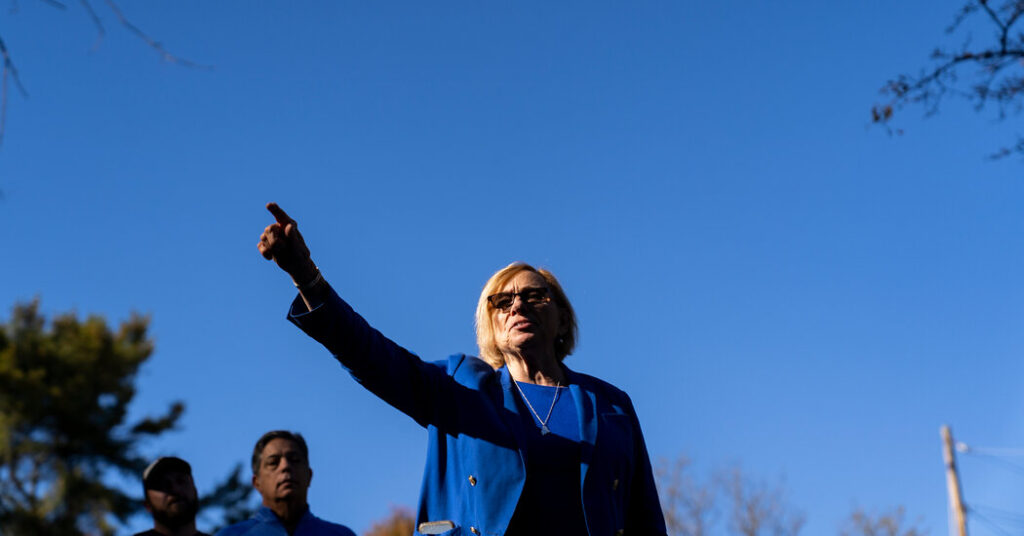After Janet Mills, the Democratic governor of Maine, challenged President Trump during a White House meeting, she became both a folk hero to her party and a political target whose state now faces a federal investigation by the Department of Education.
Ms. Mills, 77, told Mr. Trump on Friday that she would not accede to his executive order banning transgender athletes in women’s sports. “See you in court,” she said, while seated with a group of bipartisan governors in the White House State Dining Room. The U.S. Department of Education promptly informed Maine officials that the state’s education department was under a “directed investigation.”
The Trump administration “will do everything in its power to ensure taxpayers are not funding blatant civil rights violators,” said Craig Trainor, the acting head of the U.S. Department of Education’s civil rights division. He said that Maine would lose federal funds if it did not comply.
Ms. Mills did not stand down.
“Do not be misled: This is not just about who can compete on the athletic field, this is about whether a president can force compliance with his will, without regard for the rule of law,” the governor said in a statement on the escalating conflict. “I believe he cannot.”
The fight has thrust Ms. Mills, a fixture in Maine politics, onto the national stage. And it was her opposition to the first Trump administration’s hard-line immigration and anti-abortion policies that helped her become the state’s first female governor.
But her nearly five decades in state politics has been propelled by her support for law enforcement and her record as a criminal prosecutor.
Born in Farmington, Maine, an agricultural and manufacturing center, she was raised in a political family. Her father was Sumner Peter Mills Jr., a lawyer and Republican state legislator who served as the U.S. attorney for Maine under the Eisenhower and Nixon administrations.
After graduating from the University of Massachusetts and the University of Maine School of Law, Ms. Mills became Maine’s first female criminal prosecutor in the attorney general’s office. In a 1978 interview, she said, “I like prosecuting murder trials the best.”
She then became the first woman in all of New England to win a district attorney seat, pushing for better treatment of victims of domestic violence by the criminal justice system. In 2002, she won a seat in the State Legislature, and in 2009, she became Maine’s first female attorney general.
While serving as Maine’s top prosecutor, Ms. Mills clashed with Paul LePage, the conservative governor and a Trump acolyte. When Mr. LePage vetoed legislation giving the police more access to opioid overdose medication, she used settlement funds to pay for the treatment. She refused to help Mr. LePage support Mr. Trump’s 2017 ban on immigrants from predominantly Muslim countries, instead challenging the executive order in court. Mr. LePage unsuccessfully sued her.
In 2019, with Governor LePage term limited, Ms. Mills was elected to lead the state.
Ms. Mills has focused on economic policies and expanding health insurance coverage, but she has also worked with legislators to prevent health insurers from discriminating against transgender people, to allow gender-affirming hormone therapy under some circumstances for people who are 16 and older, and to enact a law that protects providers of gender transition care from being sued by other states.
She has not enacted any bills related to trans athletes, but the governor’s office does not decide who participates in high school sports. That choice is made by the Maine Principals’ Association, an independent body that oversees student sports in the state.
Before the election, Mr. Trump did not seem to know who Ms. Mills was. While campaigning in October, he mistakenly referred to Ms. Mills as a man during a call with supporters and accused her, wrongly, of planning to bring 75,000 immigrants to the state. “He’s weak and ineffective,” Mr. Trump said.
Vice President Kamala Harris won Maine, but voters leaned more right than in the past. Ms. Mills took a measured approach to Mr. Trump’s victory, telling the Portland Press Herald that she would support policies that benefit Maine and oppose ones those that hurt it.
“It’s as simple as that,” Ms. Mills said.
After Ms. Mills clashed with Mr. Trump on Friday, she predicted that Maine will not be the last state that the president investigates for defying orders that conflict with the law.
“You must ask yourself: Who and what will he target next, and what will he do,” she said. “Will it be you? Will it be because of your race or your religion? Will it be because you look different or think differently? Where does it end?”

